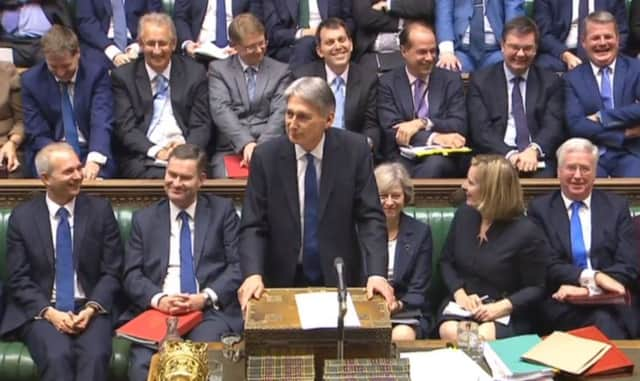Rising savings ratio looks a good bet


How so? Look no further than the gloom surrounding the Chancellor’s Autumn Statement, which openly acknowledged the huge range of uncertainty surrounding the impact of Brexit on the economy.
And that’s before taking into consideration the prospect of Donald Trump in the White House, and the recent hardening of attitudes towards Britain seen among Europe’s politicians.
Advertisement
Hide AdAdvertisement
Hide AdDonald Trump? Don’t forget that the United States is Britain’s largest export market – and the protectionist-minded Mr Trump is now its President-elect.
Paul Johnson, the director of the Institute of Fiscal Studies, put it starkly. The institute’s projections, he observed, saw no growth in real wages for a decade.
“One cannot stress enough how dreadful that is, more than a decade without real earnings growth,” he said. “We have certainly not seen a period remotely like it in the last 70 years.”
Moreover, he added, inflation-adjusted wages will be lower in 2021 than in 2008, with half the wage growth that had been projected prior to the Brexit referendum now not expected to happen.
You don’t need me to tell you that this isn’t good news. A rocky economy isn’t pleasant for anyone.
So why might it be good for your investments?
Let’s start with the savings ratio – that is, the proportion of household income that is saved, rather than spent.
Perversely, it tends to run counter to the economic cycle: when times are good, people spend a higher proportion of their income, and when times are bad, they save a higher proportion of their income.
Right now, the economy is relatively benign, and you’ll recall from the most recent GDP figures that it was higher than expected levels of consumer expenditure that buffered the anticipated economic shock that the referendum delivered. While businesses pulled in their horns, consumers carried on spending.
Advertisement
Hide AdAdvertisement
Hide AdAt present the savings ratio is at 5.1 per cent – less than half of its level at the height of the recession in 2009.
Put another way, it’s only been this low twice since the early 1970s – the dotcom boom, and the 2005-2006 mini-boom delivered by a buoyant housing market and easy credit.
So let’s return to that gloomy economic prognosis, and the coming decade of dampened economic growth.
Where do you think that the savings ratio is going to head next? If you’re not sure, note that when times are good it goes down, and when times are bad it goes up.
That’s right: the odds are looking good for a rising savings ratio.
All of which means that you, me, and pretty much everyone else is going to feel that it might be prudent to put away a little more each month . . . just in case.
And I don’t know about you, but with interest rates likely to still be very low (although probably higher than today’s 0.25 per cent Bank Rate), I won’t be squirrelling much of my extra savings into cash accounts.
Particularly as it’s likely that subdued economic activity will take some of the froth off share prices.
Advertisement
Hide AdAdvertisement
Hide AdMeaning that there might be some tasty bargains on offer – just as in 2009. And, somewhere on the other side of all this, that could mean decent gains, and a decent income from shares that were bought while they were cheap.
Now, all of this comes with a few hefty caveats.
The Brexit negotiations might go swimmingly, for one. The Institute of Fiscal Studies’ economic forecasts might be wrong. Donald Trump might recant his protectionist policies.
And so on, and so on.
But the balance of probabilities, I feel, is on those caveats being somewhat unlikely.
The UK’s savings ratio can’t keep heading downwards. We will all, I think, soon be saving a little more.
So where will you invest your additional savings?